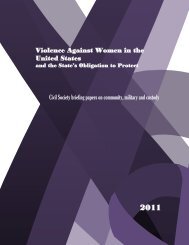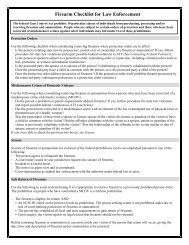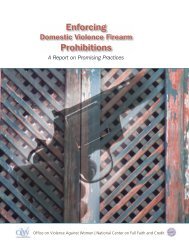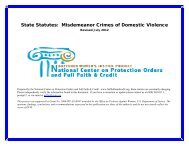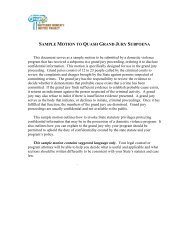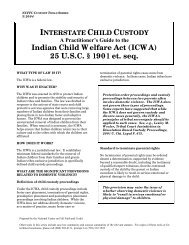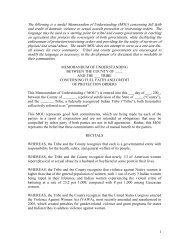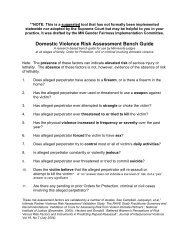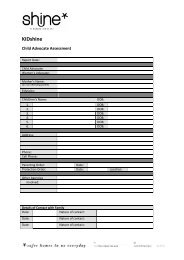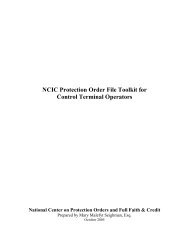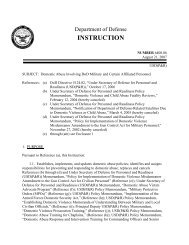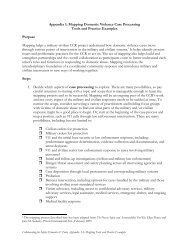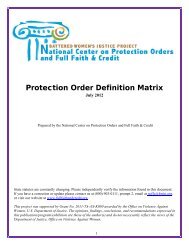Firearm Checklist for Judges - Battered Women's Justice Project
Firearm Checklist for Judges - Battered Women's Justice Project
Firearm Checklist for Judges - Battered Women's Justice Project
You also want an ePaper? Increase the reach of your titles
YUMPU automatically turns print PDFs into web optimized ePapers that Google loves.
Protection Orders<br />
<strong>Firearm</strong> <strong>Checklist</strong> <strong>for</strong> <strong>Judges</strong><br />
The federal Gun Control Act prohibits 10 particular classes of individuals from purchasing, possessing and/or<br />
receiving firearms and ammunition. People who are subject to certain orders of protection and those who have<br />
been convicted of misdemeanor crimes against select individuals may fall under two of these prohibitions.<br />
The federal law prohibits persons subject to a “qualifying” protection order from purchasing or possessing firearms and<br />
ammunition. 18 U.S.C. §922(g)(8).<br />
Under18 U.S.C. § 922(g)(8):<br />
The person subject to the order must have notice and an opportunity to be heard; and<br />
The order must restrain the person from harassing, stalking, or threatening an intimate partner of the person or a child of the<br />
person or the intimate partner; or engaging in other conduct that would place an intimate partner in reasonable fear of bodily<br />
injury to the partner or child; and<br />
The order must include either a finding that the person subject to the order represents a credible threat to the physical safety<br />
of a intimate partner or child or a prohibition against the use, attempted use or threatened use of physical <strong>for</strong>ce against the<br />
intimate partner or child that would reasonably be expected to cause bodily injury.<br />
18 U.S.C. §921(a)(32):<br />
An intimate partner is defined as “a current or <strong>for</strong>mer spouse, a current or <strong>for</strong>mer cohabitant with the person subject to the<br />
protection order” or an individual who is a parent of a child of the person against whom the order was issued.<br />
A judge should provide the petitioner and respondent with in<strong>for</strong>mation about the “official use exemption” under 18 U.S.C.<br />
§925(a)(1) <strong>for</strong> certain federal, state and local government employees who must possess and utilize a firearm or ammunition in<br />
their employment. The judge should direct the “exempt” respondent to surrender all personally owned or possessed firearms to<br />
the appropriate repository <strong>for</strong> the duration of the order.<br />
Facilitating En<strong>for</strong>cement<br />
Indicate the relationship of the parties on the protection order.<br />
Specify any prohibition related to firearms on the protection order, e.g. directives against, purchase, sale, possession or<br />
control of firearms, ammunition or permits.<br />
Otherwise, to remove firearms, use the “catch all” provision in the state protection order statute that permits the court to<br />
issue additional relief to enhance protection of the petitioner and any protected minor children.<br />
Provide in<strong>for</strong>mation that it is unlawful under federal law to purchase, possess or have control over a firearm, including a<br />
rifle, pistol or revolver or ammunition, while subject to the civil or criminal protection order.<br />
Misdemeanor Crime of Domestic Violence<br />
The federal law prohibits anyone who has been convicted of a “qualifying” misdemeanor crime of domestic violence (MCDV)<br />
from purchasing or possessing firearms and ammunition. 18 U.S.C. §922(g)(9).<br />
Under 18 U.S.C. § 921(a)(33) a “misdemeanor crime of domestic violence” is defined as:<br />
The misdemeanor is a crime under state, tribal or federal law.<br />
The crime <strong>for</strong> which the offender was convicted contained one of the following elements: the use or attempted use of<br />
physical <strong>for</strong>ce or the threatened use of a deadly weapon.<br />
The defendant was represented by counsel or knowingly and intelligently waived the right to counsel.<br />
In jurisdictions where the defendant was entitled to a jury trial, the case was tried by a jury or the defendant knowingly and<br />
intelligently waived the right to a jury trial by guilty plea or otherwise.<br />
The misdemeanor must have been committed by a person who, at the time of commission of the crime, was a current or<br />
<strong>for</strong>mer spouse, parent, or guardian of the victim, or was a parent of a child of the victim, or had cohabited or <strong>for</strong>merly<br />
cohabited with the victim as a spouse, parent or guardian, or was similarly situated to a spouse, parent, or guardian of the<br />
victim.<br />
The prohibition is permanent unless the defendant has had the conviction set aside or expunged, was pardoned, or had civil<br />
rights restored (i.e., the right to sit on jury, the right to vote, and the right to hold public office) if the convicting jurisdiction
took these civil rights away from the misdemeanant. Civil rights cannot be restored if they were not removed initially due to<br />
the conviction. Further, the convicting jurisdiction must not impose any lingering firearm restriction on the defendant after<br />
the above post-conviction relief (any one of the four -pardon, set aside, expungement or civil rights restoration) has been<br />
obtained. For example, does the state still restrict the defendant from obtaining concealed weapons permit or restrict the<br />
right to carry handguns outside the home or place or business or obtain machine guns?<br />
Surrender/Transfer/Return of <strong>Firearm</strong>s<br />
Require the surrender of all firearms be<strong>for</strong>e the defendant is released from custody and upon conviction of a MCDV.<br />
Establish a compliance mechanism <strong>for</strong> surrender of firearm (i.e., specify the place where the firearm should be<br />
surrendered, the date and time the surrender should be completed, and a description of the firearm(s) to the extent<br />
possible).<br />
Direct the Sheriff or other appropriate agency to destroy any surrendered firearm absent proof of lawful ownership (if<br />
authorized under state law). If lawfully owned, a judge may approve a plan <strong>for</strong> sale/transfer of a firearm.<br />
Establish a procedure <strong>for</strong> return of firearms:<br />
• Conduct a hearing prior to returning firearms to determine the respondent/defendant’s eligibility to possess under<br />
state and federal law.<br />
• Provide the victim with the opportunity to be heard in all proceedings related to the return of firearms and<br />
ammunition to the respondent/defendant and notify the victim.<br />
When the respondent/defendant seeks to transfer their firearms to a third party:<br />
• Determine whether or not the third party is prohibited from possessing firearms under state or federal law.<br />
• Hold a hearing to determine whether the respondent/defendant would retain access (constructive possession) to the<br />
firearm(s).<br />
• Have both the respondent/defendant and the transferee sign a <strong>for</strong>m that acknowledges that firearms may not be<br />
transferred to a prohibited party. Signing should be witnessed by court staff or under penalty of perjury as a court<br />
order.<br />
• In<strong>for</strong>m the respondent/defendant and the transferee that they may be subject to federal prosecution if they knowingly<br />
transfer or return any firearm to a prohibited person. 18 U.S.C. §922(d)(8),(9).<br />
Judicial Notification<br />
As required by the STOP Violence Against Women Formula Grant Program certification in VAWA, in order <strong>for</strong> grantees<br />
within a state to be eligible <strong>for</strong> STOP grant funding, judicial officers are required to have practices and polices in place to<br />
in<strong>for</strong>m domestic violence offenders regarding 18 U.S.C. §922(g)(8) and (9) and applicable Federal, State and local laws.<br />
The following is suggested language from the U.S. Department of <strong>Justice</strong>:<br />
Person subject to protection order.<br />
“As a result of this order, it may be unlawful <strong>for</strong> you to possess or purchase a firearm, including a rifle,<br />
pistol, or revolver, or ammunition pursuant to federal law under 18 U.S.C. §922(g)(8) and/or state law. If<br />
you have any questions whether these laws make it illegal <strong>for</strong> you to possess or purchase a firearm, you<br />
should consult an attorney.”<br />
Person convicted of MCDV.<br />
“If you are convicted of a misdemeanor crime involving violence where you are or were a spouse, intimate<br />
partner, parent, or guardian of the victim or are or were involved in another, similar relationship with the<br />
victim, it may be unlawful <strong>for</strong> you to possess or purchase a firearm, including a rifle, pistol, or revolver, or<br />
ammunition, pursuant to federal law under 18 U.S.C. 922(g)(9) and/or state law.”<br />
National Center on Protection Orders and Full Faith & Credit<br />
(800) 903-0111, prompt 2<br />
NCFFC@bwjp.org<br />
www.fullfaithandcredit.org<br />
This project was supported by Grant No. 2006-WT-AX-KO47 awarded by the Office on Violence Against Women, U.S. Department of <strong>Justice</strong>. The opinions,<br />
findings, conclusions, and recommendations expressed in this publication/program/exhibition are those of the author(s) and do not necessarily reflect the views<br />
of the Department of <strong>Justice</strong>, Office on Violence Against Women.



